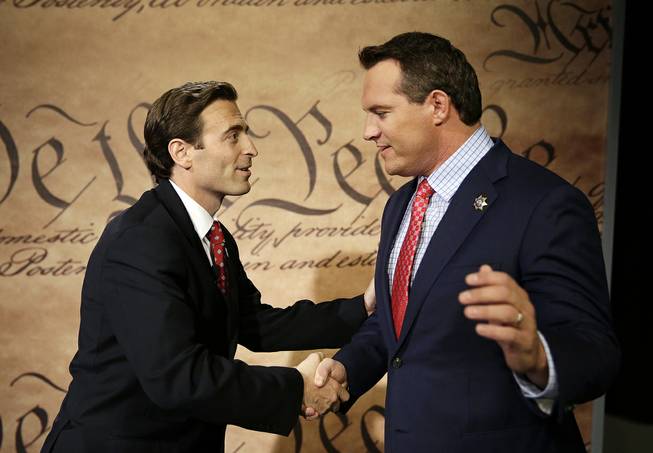
AP Photo/John Locher
Adam Laxalt, left, shakes hands with Nevada Secretary of State Ross Miller before they debate Friday, Oct. 10, 2014, in Las Vegas. Laxalt and Miller are facing each other in a race for attorney general in Nevada.
Wednesday, Jan. 21, 2015 | 5:35 p.m.
Election season ended Nov. 4 with an unprecedented surge that saw Republicans sweep all six state offices and take control of the Assembly and Senate. But for candidates, both winning and losing, the campaign money kept coming.
Nevada candidates brought in about $2.8 million from Nov. 5 to the end of the year, according to campaign finance reports filed with the Secretary of State's office.
Leading the way was Attorney General Adam Laxalt, who brought in an eye-popping $353,518 from 147 different donors after the election. That's more than 14 times the $24,940 former Attorney General Catherine Cortez Masto brought in after her win in 2010, although that race wasn't as competitive as this year's.
Laxalt was considered an underdog for much of his campaign against Ross Miller, and his win found him new supporters, many of whom had previously thrown their money behind Miller.
Included in that group are brothers Lorenzo and Frank Fertitta III, who gave Laxalt's campaign $10,000 through Zuffa, LLC, which owns Ultimate Fighting Championship, and $20,000 more through various Station Casino properties. Miller received at least $55,000 from Zuffa and Station Casino properties leading up to the election, according to campaign reports.
Other post-election giving to Laxalt included $10,000 contributions, the maximum allowed, from the Nevada Realtors political action committee, International Gaming Technology, Konami Gaming Inc., the Bellagio and MGM Resorts International. Political heavyweights Boyd Gaming, Barrick Mining, Golden Gaming and NV Energy also gave to Laxalt after his win.
Miller brought in just $14,200 after his loss.
Some campaigns are in debt following the election and candidates need to bring in money to pay off the last of their bills, UNLV political scientist David Damore said. Contributions made before the end of the year also don't count against the candidate's fundraising limit for future run for office, allowing businesses and individuals to give another $10,000 during the next election cycle.
But post-election contributions are also a way to curry favor with the winners.
"Retiring campaign debt is a big reason. The second is, of course, access," Damore said. "Particularly in the case of the Assembly where nobody expected those people to be running committees, that provides a pretty big hook to go out and get donations."
All contributions made after the election are completely legal and can be used by candidates on future campaigns.
Here's a look at who else saw a post-electoral windfall:
• Republican state Sen. Becky Harris brought in $115,074 from 66 contributors after she bested incumbent Justin Jones in one of the year's most heavily funded races. Harris' top contributions included $10,000 from the Nevada Realtors political action committee, $7,500 each from MGM Resorts International and the Nevada Subcontractors Association, $5,000 from Boyd Gaming and $4,000 from Dotty's. Jones raised just $5,000 following his loss.
• Newly minted Senate Majority Leader Michael Roberson brought in $98,996 following his election win, including $10,000 from SunStreet Energy Group, a residential solar panel system company, $5,000 from the Orleans casino and $4,000 from payday loan company Check City.
• Two other statewide office holders, Lt. Gov. Mark Hutchison and Secretary of State Barbara Cegavske, joined Laxalt in bringing in big contributions after the election. Hutchison raised $78,917 and Cegavske raised $81,589 between Nov. 5 and the end of the year.
• Money was slow coming in initially for Republican Assemblyman John Hambrick, who raised just $400 in the month after the election. That changed when Hambrick became speaker of the Assembly, the body's top post, following the ousting of Ira Hansen from leadership after insensitive columns he penned for the Sparks Tribune resurfaced. Hambrick was appointed to the Assembly's top post on Dec. 2 and received $59,750 in contributions over the next 29 days.
• Among Democrats, Senator Aaron Ford fared the best in terms of post-election fundraising thanks to his new post as Senate minority leader. Ford raised $111,754 after Nov. 4, with $10,000 contributions from the Citizens for Justice Trust, the David Francis Law Firm and Eglet Wall Christiansen law firm.

Join the Discussion:
Check this out for a full explanation of our conversion to the LiveFyre commenting system and instructions on how to sign up for an account.
Full comments policy